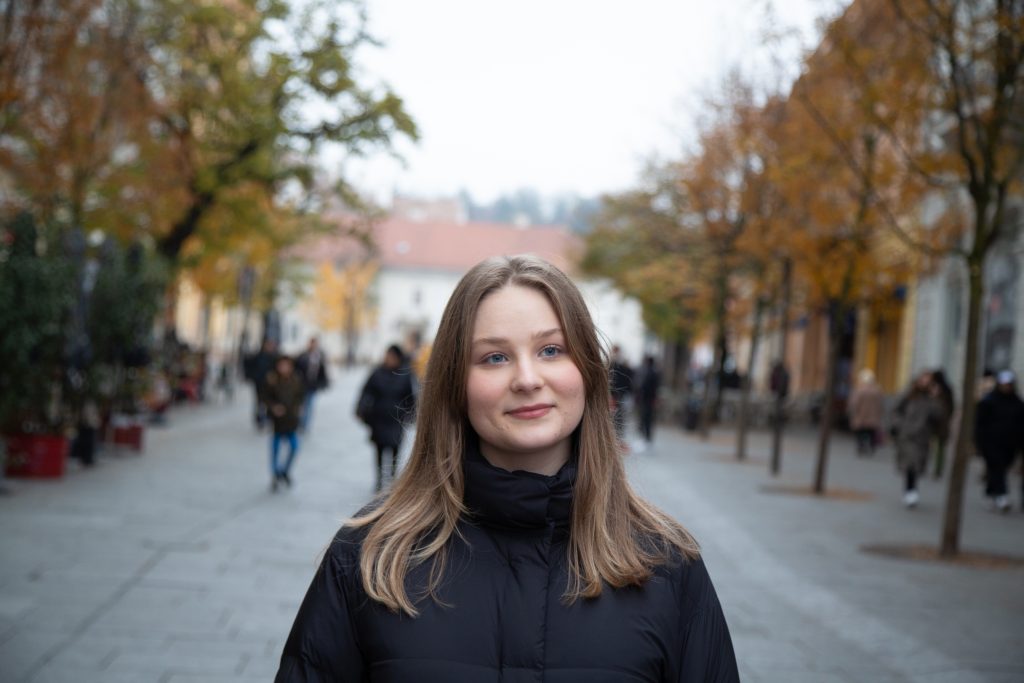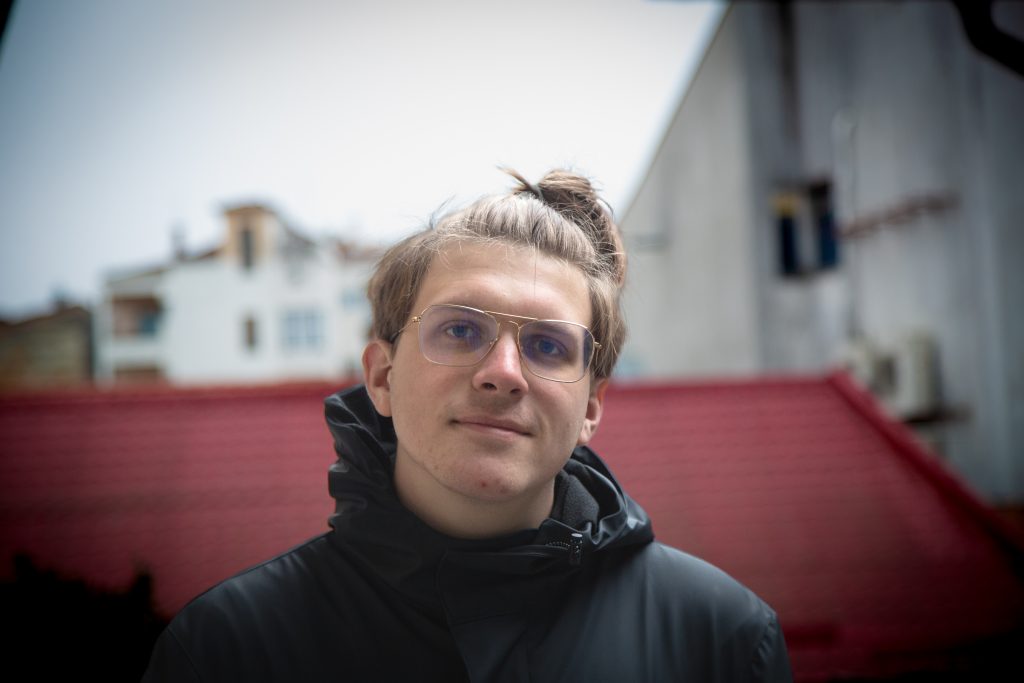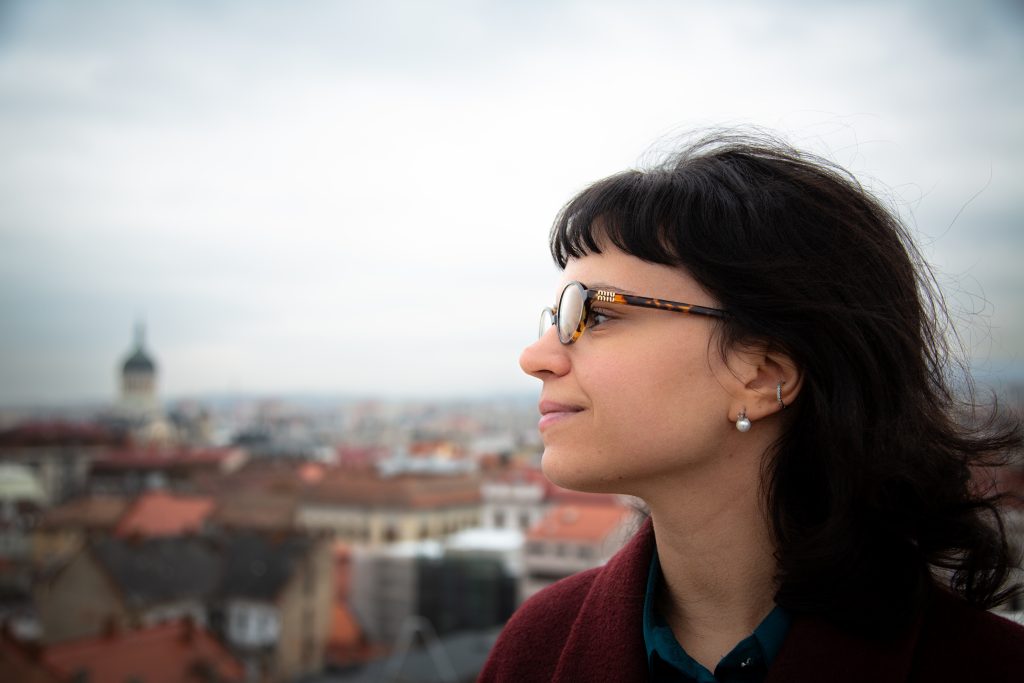Hold the Fort
These youth are holding the fort for the peace building in Romania. How to cultivate trust, hope and love in the middle of war? (Reading time 10 minutes.)
Photos & videos: Heli Pekkonen
Text: Johannes Roviomaa
This is a story of young Ukrainians who are building a new future in Romania. We also dig into peacebuilding in Romania and beyond with the eyes of a young peace professional. What can we learn from the mistakes made in peace-building in Europe?
“Our house is in the middle of the street.”
TRANSILVANIA, ROMANIA. Cluj-Napoca is a city surrounded by hills, lying in a valley like a king’s crown. It is Mid-November and daytime temperatures are a few degrees celsius above zero. In Latin, ‘Transylvania’ means “on the other side of the woods”.
A raven flies onto the roof of a stone building in the centre of Cluj-Napoca. We enter the courtyard, where we find the stairs to the Ukraine House, which opened its doors in August 2022.
Inside the building we meet Anna Shevchenko, 21, and Robert Konoplia, 20, an Ukrainian couple, who fled the war – which has lasted more than a thousand days.
They both grew up from children to young adults in the midst of war.
Born in the capital city of Kyiv in 2004, the year of the Orange Revolution, “I’m the child of revolution”, says Shevchenko. As a child she took part in protests with her parents every weekend in Maidan Nezalezhnosti (Independence Square) centrum of Kyiv. Ten years later, the Revolution of Dignity transpired.
Later, when Russia invaded the Crimea Peninsula and started a war in Donbas region, her family remained on the Crimean side. She has not seen her sister or brother for eight years. “I don’t know if I can ever see my grandmother again”, she says.

Anna Shevchenko

Robert Konoplia
”I saw a lot of tanks and soldiers there crossing this area in Borova village”, says Konoplia, who spent the summers of his childhood in that village. He was born in Kharkiv, the second largest city of Ukraine, near Donetsk and Luhansk region that Russia annexed illegally in 2014.
Kharkiv is one of the cities that has been so badly destroyed by Russia that it is hardly recognisable.
When Russia started the full-scale attack on the 24th of February 2022 in Ukraine, by coincidence, Anna and Robert were at a ski resort in the Carpathian mountains, in the South-West part of Ukraine celebrating Anna’s 18th birthday. As they were not far away from the Romanian border (about 250 kilometers from Cluj-Napoca), they decided to escape to Romania.
For the first few days, they lived in the apartment of a young Moldovan couple who later became their close friends.
”Maybe I was the lucky one, because I met only good people on my path, who were always open to help and assist me in anything”, says Shevchenko.
After the first shock wave, Anna and Robert started to work as volunteers in immigration office in Cluj-Napoca. They helped Ukrainians with bureaucratic work, documents – and how to get temporary protection. They created a Google Sheet for the Ukrainian refugees. “It may have been a little bit illegal, but circumstances needed it”, they say.
Cluj-Napoca is a city of young people. Population is three hundred thousand, a third of them are students. Despite the uncertainty of the war, the Ukrainian couple focuses on building the future. Shevchenko says that one of the most important things was that they were both able to continue university studies in Romania. They study International Business Management.
They started an organization called “ATUR” (Asocjatsia Tinerilor Ukrainian Youth în România). Aim is to bring together young Ukrainians from all over Romania. ”We are encouraging Ukrainian youth to unite”, says Konoplyan. They are planning a field trip with their Ukrainian friends. They are talking about budget, fundings, grants, organising events, and how to support the Ukrainian community.
The Ukraine House is funded by Patrir (Peace, Action, Training and Research Institute of Romania) and The UN Refugee Agency. The house is providing a safe space, psychological support, and language training in English and Romanian, for Ukrainian communities. Now most of the events are community-led, says Iuliana Niga, Project Coordinator of Ukraine House. She is Romanian, with Ukrainian roots. Niga says it’s all about making sure people who need help and security the most, get it.
”There are a lot of tools that are in place to minimize the harm. Our colleagues have been taking part in trauma training. We are also offering psychological support to both adults and children”, says Anamaria Tunduc, Project Manager at Patrir.
“We have a lot of colleagues from Mariupol which is now destroyed. I can’t even think how they are feeling in these circumstances”, Niga says.
There are approximately 160 000 Ukrainians in Romania who have fled the war and received temporary protection.
”Ukrainians are facing the hardest time ever and yet they stand together and are resilient. They are able to continue caring about other people, that gives me hope.”
The future of Ukraine
No one knows what will happen to Ukraine and its future.
”We have to do everything to be organized. We need to be prepared and concentrate on our own power, not to rely on others”, says Konoplia.
“We should be prepared for another one, but we need to use this peaceful time very effectively to attract investments from other states, to attract tourists, to do anything we can to develop Ukraine and then our future will be brighter”, Konoplia says.
Anna would like to be involved in the social reconstruction of Ukraine. According to her, Ukraine needs an “elite group that understands the importance of education, culture and art for the nation as a whole”. Trust must be rebuilt within Ukraine but also with Ukrainians who have escaped to other countries.
In the future Robert and Anna would like to see Ukraine joining the European Union.
The current war has also united Ukraine, they say.
”Ukrainians are facing the hardest time ever and yet they stand together and are resilient. They are able to continue caring about other people, that gives me hope”, says Anna.
Konoplia has a mixed feeling about the fact that he fled Ukraine. He feels guilty, but also relieved. Coincidence can sometimes determine the thin red line between life and death.
He managed to avoid being drafted into the army because he was 17 when the war broke out. Ukrainian men aged between 18 and 60 are not allowed to leave the country except with special permission.
Konoplia says that peace is “мир” (myr) in Ukrainian language. “It has a different meaning and connotation than the English word peace. “It doesn’t have a deeper meaning, for example inner peace”, he says.

Laura Pistarini Teixeira Nunes
“We are not alone”
From Ukraine House, we continue our journey to a quiet residential neighbourhood, close to Cluj Arena, a massive football stadium that could accommodate a tenth of the city’s population.
”I’ve come to realize how much peace is related to justice and you can not have peace without justice and accountability”, says Laura Pistarini Teixeira Nunes, 28. She was a project manager in PATRIR.
We are having this dialogue in a two-storey detached house which is the headquarters of PATRIR.
“PATRIR has always been focusing on peace processes, dialogue initiatives, social cohesion and youth work at local level”, Pistarini says.
PATRIR stands for Peace Action, Training and Research Institute of Romania and their scope of work stretches from peace education to humanitarian response.
”The most important thing is to develop emotional skills and understand your own trigger points”, Pistarini says. While remembering “We have a group of people and they can hold the fort for others that need to take some rest. We are not alone”, she says.
The scars left by the political system, the fear of the future, the ghosts of the past, unite people around the World.
Pistarini is collaborating with the United Network of Young Peacebuilders as a regional coordinator for Europe.
She enjoys working in the field.
”Working on the ground, literally grounds me to reality even though it is incredibly difficult. Working on the field does give me hope. There is always something that you can do.”
Pistarini says that people in Europe haven’t really processed the traumas of colonialism, or World Wars, or what impacts dictatorships and communism regimes have left to people in Eastern Europe.
Pistarini was born and raised in São Paulo, Brazil. She is also an Italian citizen. Her interests of social justice, equality, feminism, and democracy comes from the family.
“I had to deal with a lot of anger, shame, guilt and frustration for many years – and processing all of those feelings. It wasn’t easy”, says Pistarini.
Pistarini says that her interests of social justice, equality, feminism, and democracy comes from the family.
”We have a saying in Brazil ‘you can always put more water in the beans’. It means that you can always enlarge and be generous to others even when you don’t have much”, says Pistarini.
Romania is a relatively new democratic country. The communist era ended in 1989. Romania joined the European Union in 2007.
The current political situation in Romania is divided, with rural dwellers disappointed by the promises made by the social democrats after the revolution. The result of the Romanian presidential election was annulled in December 2024. The Constitutional Court decided to annul the first-round vote after allegations of Russian interference.
Pistarini says that peace work in Romania doesn’t differ much from other Western Europe countries. The Far-right is complex, organised, and rising. There are tensions within, between Hungarians and Romanians, between host communities and foreigners and asylum seekers, us and them.
One of the most meaningful moments for Pistarini during the New Gen -project was understanding that there are so many people who are working with these extremely complex issues and holding fort for maintaining resilience.
”Peace is not only the cessation of hostilities”, Pistarini says.
“We, as civil society and non-governmental organizations, would need a common strategy. There is no common voice for peace.”
Pistarini shows one of her favourite places in Cluj-Napoca. We climb up to the Firefighter’s Tower. From the roof we can see the whole city, its history, different religions and cultures – medieval, baroque, socialism regime, Renaissance, modern times – and mountains of the Eastern Carpathians. The city has five churches, Greek Catholic, Orthodox, Lutheran, Catholic and Roman Catholic.
The skyline of the city is orange and yellow, with brick, steel, glass and concrete. Buildings with collapsed roofs and buildings under construction.
Up here you can see a clock which has stopped. Pistarini explains that the clock symbolizes the moment when dictator Nicolae Ceausescu, (who led the Romanian Communist Republic from 1965 to 1989), escaped by helicopter in 1989. Later, he was executed during a violent revolution.
The Firefighter’s Tower was originally built to detect fires in the city.
Pistarini calls for strategic approach in the peace work field. “We, as civil society and non-governmental organizations, would need a common strategy. There is no common voice for peace.”
“How can we deal with these incredible challenges if we don’t have a common voice and common strategy?”, Pistarini says.
One could say that the role of peacebuilders is to identify danger signs in society. They form a chain, passing the bucket to each other to prevent the fire from spreading.
On the rooftop there is an iron model of Cluj-Napoca, like a board game, where peace workers at Ukraine House and Patrir occupy a small but important corner. The borders can be spiritual, between “us” and “them”, it can be a physical wall, a line drawn on a map, it can be metaphysical – between life and death.
War is very visible, yet the issues that matter most to society are often imperceptible – the feeling of justice, hope, security and safety. Peace is something which we cannot appreciate until we lose it.
The same rule applies to peace work as to democracy in general: it is slow to build, but quick to destroy.
The sun is setting behind the horizon, and the foggy city falls silent. A dark curtain descends over the city. A new generation has awakened to a reality in which democratic systems, international law and trust between people is faltering.
Pistarini says that it is a bit cliché that you should find peace within yourself before doing peacework with others.
“You can be broken and strong at the same time.”
CRITICAL QUESTIONS OF PEACE – ROMANIA
What gives you hope?
If I would be him or her, what would I do?
Informing and being responsible
European space is filled with contradictions
What can I do to make me feel more at peace?
